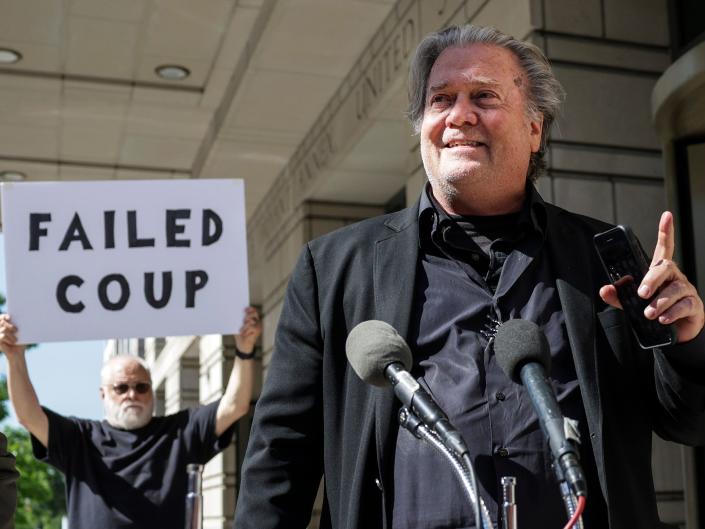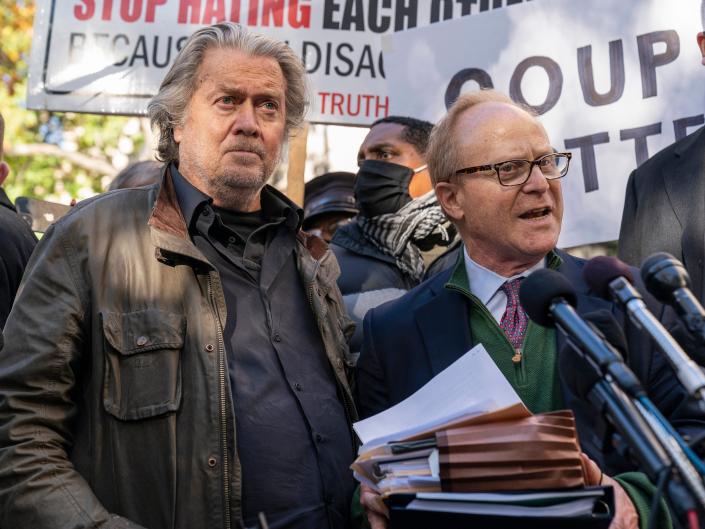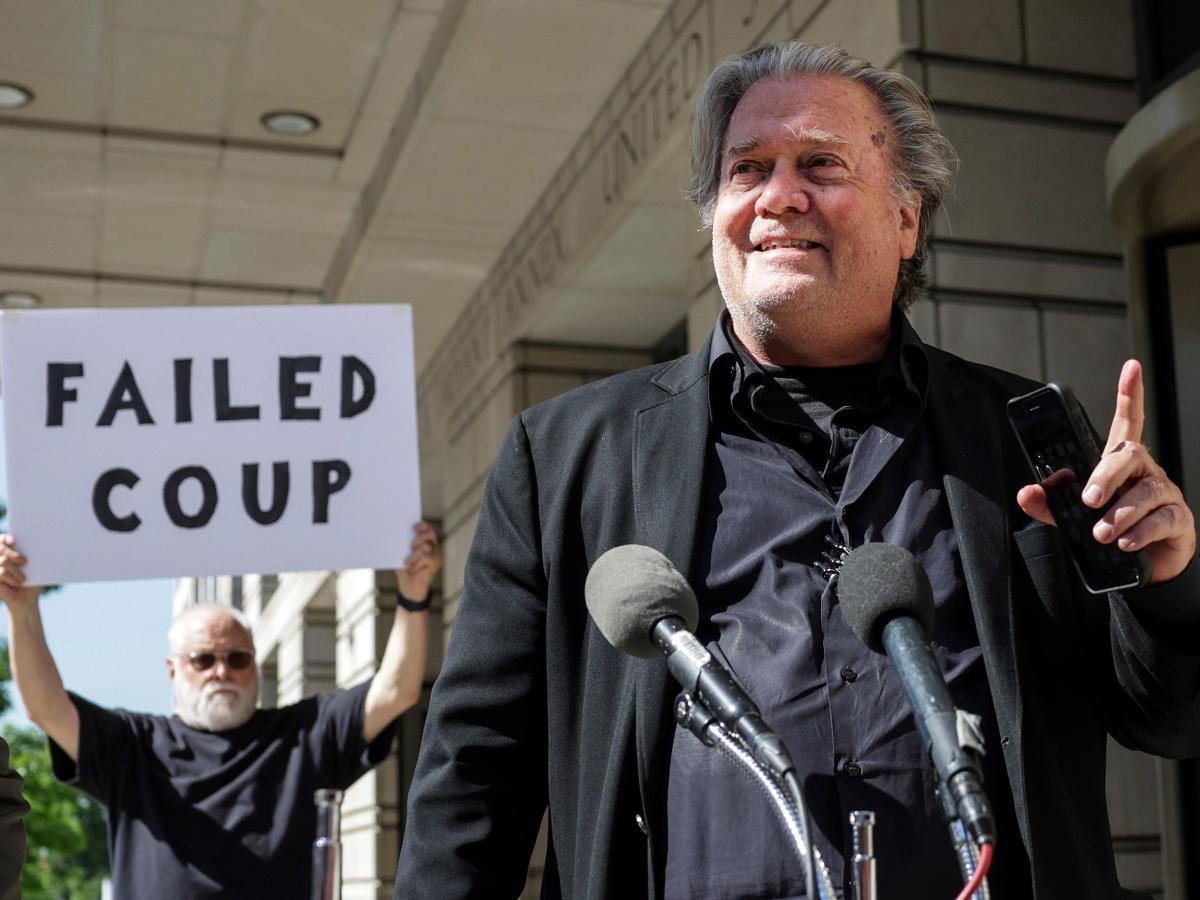
-
A series of court decisions severely limited Steve Bannon’s defense arguments during the trial.
-
Bannon unsuccessfully insisted on adjourning the trial and calling members of the House as witnesses.
-
Prosecutors see their case as straightforward: Bannon illegally dismissed the House Jan. 6 panel.
Within weeks of charging Steve Bannon with contempt of Congress, federal prosecutors made it clear that they viewed the case as a relatively straightforward one.
In a December lawsuit, prosecutors said they expected they would need only “one day of testimony” during the trial to prove that Bannon criminally defied the House committee investigating the January 6, 2021 attack on the Capitol. It seemed like a bold claim at the time, but with the jury selection trial starting Monday, the case against Bannon becomes devastatingly simple.
A series of pre-trial rulings have left Bannon virtually defenseless, preventing him from making some of the arguments his lawyers hoped to make. At a hearing in Washington, D.C., last week that thwarted many of Bannon’s planned defenses, U.S. District Court Judge Carl Nichols ruled that his attorneys could not argue that the administrative law allowed its refusal to sit for questioning or to submit documents to the court. House to hand over, apologized. Commission.
Nichols, a Trump appointee confirmed in 2019, similarly prevented Bannon’s defense team from arguing that his former role as chief strategist for former President Donald Trump’s White House justified his opposition. The judge also banned Bannon’s lawyers from referring to internal Justice Department memos detailing restrictions on congressional subpoenas, and he echoed the former Trump adviser’s hopes of calling house speaker Nancy Pelosi and other lawmakers. to testify.
Months earlier, Nichols ruled Bannon could not argue that he had decided not to comply with the House committee subpoena based on his attorney’s advice.
The combined effect of the rulings prompted Bannon’s lawyer, David Schoen, to ask a question in public court on Monday: “What’s the point of going to trial here if there’s no defense?”
Indeed, the prospects for Bannon’s trial look grim, legal experts told Insider.
Any chance of evading conviction likely relied on legal arguments that could have clouded the case for jurors. But in response to the Justice Department’s objections, Nichols has withdrawn that defense.
“In my day, we used to call this a slow-motion IOU,” said Barb McQuade, a law professor at the University of Michigan and former American attorney in Detroit. “We all know how this is going to end, what a belief is.”

Then why go to court?
Bannon promised to make his prosecution a “crime from hell” for the Biden administration, but his continued desire to stand trial has potential benefits beyond the ability to defend himself as a MAGA martyr.
“Based on everything we know about Steve Bannon, it’s going to be a circus because that’s how Steve Bannon rolls,” McQuade said.
By continuing the trial, Bannon will retain the option to appeal a guilty verdict, said Jeffrey Bellin, a William & Mary Law School professor and former federal prosecutor.
“Even though the judge has ruled out most of the defense, Bannon still has the right to force the government to prove its case against him at trial. And since there’s more to this than just legal strategy, that’s what I’d expect,” Bellin told Insider.
“By going to court,” he added, “Bannon will have a public platform to challenge the charges, and will retain the legal issues, such as the applicability of administrative law, for appeal. The alternative is to find him guilty.” One problem with that is that guilty pleas often require defendants to agree not to appeal.”
Bannon’s defense team is already looking forward to that next step.
Prior to the scheduled start of the jury selection on July 18, his lawyers twice asked for the trial to be postponed in light of the publicity surrounding the committee’s recent series of close hearings on January 6. Bannon’s lawyers also pointed to his recent offer to testify before the committee, a turnaround they attributed to a recent letter from Trump in which he waived an alleged claim of executive privilege.
But prosecutors rejected the offer as a “last attempt to avoid liability, and Nichols refused to delay the trial until at least October. On Thursday, Schoen asked Nichols if he could continue to document publicity to address the issue of the trial. to keep.” timing for a possible appeal.
Nichols invited that further documentation, but said, “I think it’s very well preserved.”
Any challenge to a guilty plea would likely address Nichols’ decision to shield the argument that Bannon relied in good faith on his attorney’s advice in defying the House committee. Nichols appeared to be reluctant to make the decision, writing that he was bound by decades-old precedent set by the US Court of Appeals for the DC Circuit.
“If this were a matter of first impression, the Court might be inclined to agree” [Bannon] and admit this evidence,” Nichols wrote.
An appeal from Bannon could give the DC Circuit a chance to reverse that precedent.
Bannon’s Defense
It’s unclear what strategy Bannon’s lawyers will wring out of the many rulings that have limited their defenses. But Nichols has indicated that there is one more argument on the table: Bannon believed his deadline to respond to the January 6 House Committee subpoena was not firm, but “malleable” — or flexible — and “not as hard and fast as the government says.”
Nichols said Bannon’s recent offer to testify, after months of thwarting the Jan. 6 commission, could be relevant to that argument. He left open the possibility that Bannon would bring up his recent discussions about testifying before the commission, despite federal prosecutors’ arguments that his last-minute offer was irrelevant to the case.
“The crime of default is complete at that point,” said US Assistant Attorney General Amanda Vaughn. A defense argument that Bannon saw the deadline as movable and always intended to comply with the subpoena would be “no different,” Vaughn added, of a fraud case. Defendant says, ‘I always intended to pay back the money.'”
“I’m not saying it’s a strong argument,” Nichols said.
Ahead of the trial, defense attorneys said they plan to call as a witness Robert Costello, a lawyer who represented Bannon in his dealings with the House Committee on Jan. 6. They also said Bannon “will testify”, but as with any criminal case, the decision to summon the defendant will likely come at the last minute.
Prosecutors, meanwhile, plan to call just two witnesses — an FBI agent and Kristin Amerling, the House January 6 panel general counsel — with the option to call another commission attorney to discuss communications with Bannon. to discuss his statement. FBI Agent Stephen Hart will testify about statements made by Bannon and Costello “regarding the defendant’s subpoena and default.”
Amerling will testify about the Jan. 6 House Committee investigation, subpoena and Bannon’s decision not to transfer files or sit for questioning last year.
For prosecutors, it’s a case as quick and easy as they envisioned last year.
As Vaughn said in court on Monday, “It’s about whether he was subpoenaed, whether he was aware of it, and whether he showed up when he knew he needed to be there.”
Read the original article on Business Insider

